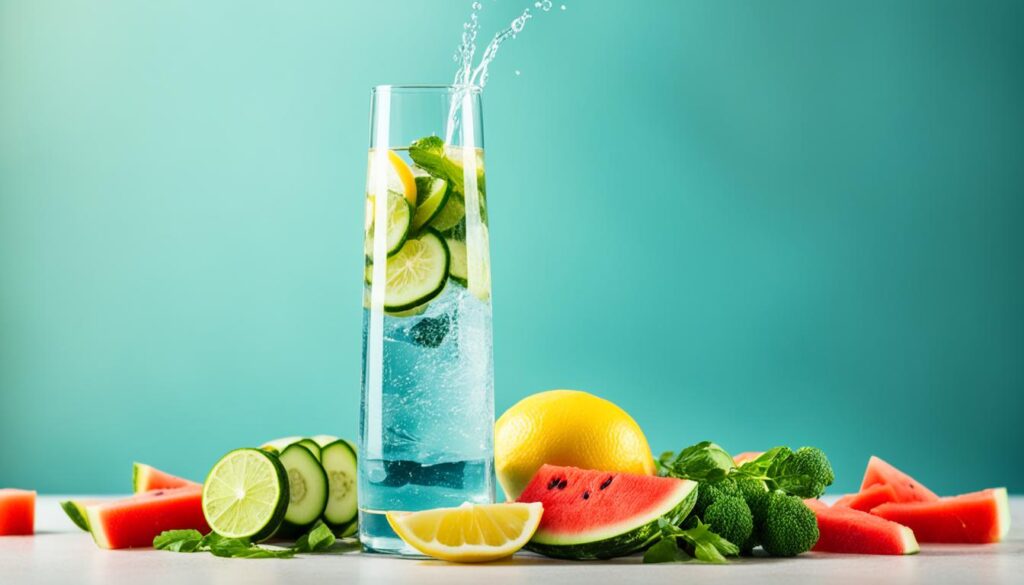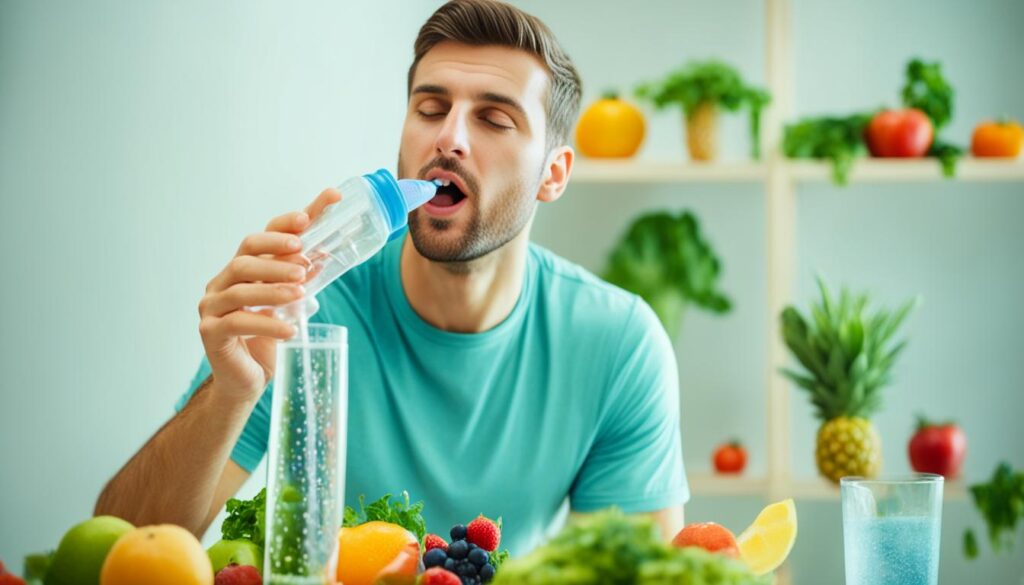Staying hydrated while fasting is crucial. After all, water makes up 60% of our body. It does a lot for us. Water helps move nutrients around, keeps our body temperature at the right level, and makes sure our joints work smoothly.
Our bodies manage water with hormones. These hormones control how much we pee and tell us when to drink more. We all use about 2.5 liters of water a day. That water comes from the things we drink, the food we eat, and how our body works.
When you fast, and especially when you only drink water, you get zero fluids from food. This means 20% of your fluid needs have to come directly from water you can drink. If you don’t drink enough, you might feel thirsty or get a headache. You could even have trouble thinking clearly.
This is even trickier for older folks. They might not feel as thirsty, so they don’t drink enough. Yet, water is vital for thinking clearly. It’s because our brain is mostly made of water. How much water you personally need can be different. It depends on your age, gender, how active you are, and the weather. But, generally, women should aim for about 2 liters a day, while men need roughly 2.5 liters. This advice comes from the experts at the European Food Safety Authority.
Key Takeaways
- Around 20% of fluid needs come from food consumption during fasting.
- Healthy adults should start with drinking 30-35 mL of water per kilogram of body weight for optimal hydration.
- Electrolyte depletion can occur during fasting and physical activity.
- Symptoms of low electrolyte levels include headaches, heart palpitations, lightheadedness, muscle cramps, and fatigue.
- Urine color can indicate hydration levels, from light straw color signifying good hydration to concentrated yellow indicating dehydration.
Importance of Hydration During Water Fasting
Maintaining proper hydration is key during water fasting. It supports physical and mental health. The lack of fluid from food can hurt these functions.
Physical Benefits
Hydration is crucial during water fasting for your body’s health. It helps with keeping the right temperature, getting rid of waste, and keeping the heart healthy. A hydrated body works better, allowing our organs to do their jobs well.
Experts suggest starting with 30-35 mL of water for every kilogram you weigh. This amount helps you meet your body’s hydration needs.

Mental Benefits
Staying well-hydrated is also important for your mind. It keeps you sharp and focused. Without enough water, your mental abilities can decrease quickly.
Drinking water during fasting keeps the brain working right. This leads to better focus and clear thinking.
Risk of Dehydration
Dehydration is a big risk in water fasting. It causes headaches, a fast heart rate, feeling dizzy, muscle cramps, and tiredness. It’s smart to check your urine color to see if you’re hydrated enough. If your urine is a straw color, it means you are well-hydrated.
Maintaining your electrolyte levels is also vital. These include sodium, potassium, magnesium, zinc, and calcium. They help your body work properly. Good hydration prevents kidney and brain problems during fasting.
How to Stay Hydrated During a Water Fast
Staying hydrated during a water fast is key. Normally, about 20% of our daily fluids come from food. To account for this, it’s crucial to drink more water. The body can store water in the muscles thanks to glycogen. This underlines how important hydration is, especially during fasting.

Recommended Water Intake
Experts suggest 30–35 mL of water for each kilogram you weigh daily. For most, this adds up to 2-3 liters. Remember, your needs might be different. Drinking mineral water keeps up essential minerals. These minerals are key to remain hydrated while fasting.
Indicators of Hydration Status
Checking your urine color is one way to tell if you’re hydrated enough. Light yellow means you’re doing well. Dark yellow or amber might mean you need more water. If it’s very clear, you might be drinking too much. This simple check helps manage your water intake during a fast.
Electrolyte Balance
Sodium, potassium, magnesium, zinc, and calcium are key electrolytes. They help our body work. If you lack them, you may feel headaches, tired, or dizzy. Eating foods high in electrolytes is important. Athletes, especially, need to keep their electrolyte levels up to avoid serious health problems. *
Summing up, staying hydrated during a water fast means drinking enough water, watching your urine, and balancing electrolytes. These steps not only make the fast better but also look after your health.
Best Practices for Hydration During Water Fasting
It’s key to stay hydrated during a water fast. This keeps you healthy and makes the fast easier. Following good hydration practices enhances how you feel and think.
Types of Water
Choosing the right water matters when fasting. Start with filtered water to get rid of impurities. But, mineralized water is better for fasting. It adds back minerals like magnesium and potassium that your body needs. Mineralized water hydrates and supports muscle and nerve action with its added electrolytes.
Timing and Frequency of Water Intake
Drinking water regularly is vital. Aim for even, small amounts throughout the day, instead of big gulps now and then. This keeps your hydration level steady and helps your body regulate itself. For those in good health, about 30–35 mL of water per kg of body weight daily is a solid goal. Adjust this for how active you are and the weather. If you exercise a lot or it’s hot, you’ll need more water to make up for what you lose in sweat.
Watch your urine color to check if you’re drinking enough. If your urine is clear to pale yellow, you’re probably well-hydrated. Darker urine means you need to drink more water. Staying hydrated helps avoid dehydration signs like headaches, heart fluttering, and muscle cramps. This makes fasting easier to bear.
Follow these hydration tips for a smooth water fast. It helps your body work well, and it makes fasting more pleasant. Using the correct kind of water and drinking regularly are essential parts of staying hydrated during a fast.
Maintaining Electrolyte Balance
Keeping your electrolytes in check is vital while on a water fast. They include sodium, chloride, and magnesium, which your body needs to work right. If you lack these, you might feel headaches, tiredness, or muscle cramps. For fasts over 48 hours, adding electrolytes is a good idea to prevent imbalance.
Essential Electrolytes
Sodium, chloride, potassium, and magnesium are must-haves during fasting. They help with nerve and muscle work. How much you need depends on fasting length, your body shape, workout routine, and more. Taking electrolytes doesn’t stop your fast’s benefits, so you’re good to keep them balanced.
Sources of Electrolytes
You can get electrolytes from food and drinks, like watermelon and celery. Also, things like bouillon can help. If your fast goes on a while, or if you have special needs, consider supplements. Talking to a doctor can help you find the right dose to avoid too little or too much.
If you get headaches, feel dizzy, or have sore muscles, adjust your intake. Starting slow and increasing as you see fit is the smart way to take electrolytes during fasting.




